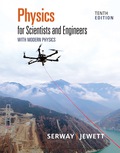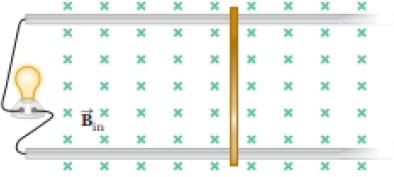
Consider the apparatus shown in Figure P30.32: a
Figure P30.32

(a)
Answer to Problem 32AP
Explanation of Solution
Given info: Magnetic field of system is
The emf develop in the system can be given as,
Here,
The current developed in the bar can be given as,
Here,
Substitute
Thus, the expression for current is
Conclusion:
Therefore, the expression for current as a function of
(b)
Answer to Problem 32AP
Explanation of Solution
Given info: Magnetic field of system is
The power delivered to the light bulb can be given as,
Here,
As the power is function of both force and speed, in order to maximize the power both force and velocity needs to be maximum. The desired condition can only be achieved if there is loss of energy whatsoever which can only be possible if the particle is in equilibrium.
Thus, the analysis model which describes the moving bar for maximum power is particle under equilibrium.
Conclusion:
Therefore, the analysis model which describes the moving bar for maximum power is particle under equilibrium.
(c)
Answer to Problem 32AP
Explanation of Solution
Given info: Magnetic field of system is
The magnetic force applied on the bar can be given as,
Substitute
Rearrange the above equation for
Substitute
Thus, the speed of the bar is
Conclusion:
Therefore, the speed of the bar when maximum power is delivered to the light bulb is
(d)
Answer to Problem 32AP
Explanation of Solution
Given info: Magnetic field of system is
The current in the light bulb can be given as from equation (1),
Substitute
Thus, the current in light bulb is
Conclusion:
Therefore, the current in light bulb when maximum power is delivered is
(e)
Answer to Problem 32AP
Explanation of Solution
Given info: Magnetic field of system is
The power delivered to the light bulb can be given as,
Substitute
Thus, the maximum power delivered to the light bulb is
Conclusion:
Therefore, the maximum power delivered to the light bulb will be
(f)
Answer to Problem 32AP
Explanation of Solution
Given info: Magnetic field of system is
The mechanical input power can be given as,
Substitute
Thus, the maximum mechanical input power is
Conclusion:
The maximum mechanical input power delivered to the bar is
(g)
Answer to Problem 32AP
Explanation of Solution
Given info: Magnetic field of system is
Consider the expression for speed of the bar from equation (2).
As speed of the bar depends on the resistance, therefore it will change if the resistance increases.
Conclusion:
Therefore, the velocity will change if the resistance increases.
(h)
Answer to Problem 32AP
Explanation of Solution
Given info: Magnetic field of system is
Consider the expression for speed of the bar from equation (2),
From the above equation, the speed will be directly proportional to the resistance if all other variables are held constant.
Thus, the speed of the bar will increase if resistance increases.
Conclusion:
Therefore, the speed of the bar will increase if the resistance increases.
(i)
Answer to Problem 32AP
Explanation of Solution
Given info: Magnetic field of system is
As far as the mechanical power input is concerned it only depends on the load and the velocity of the object. Since the current in electrical machinery is analogous to mechanical load, an increase in current will lead to change in mechanical load which further changes the mechanical power input.
Thus, the mechanical power input will change.
Conclusion:
Therefore, the effect of increase in resistance and current on the mechanical power input is that it will change.
(j)
Answer to Problem 32AP
Explanation of Solution
Given info: Magnetic field of system is
Both current and resistance can never increase as it violates Ohm’s law which says that current is inversely proportional to resistance.
In order to increase current despite increase in resistance, the load demand will increase to increase the current supply, this further increases the power.
Thus, the mechanical power input will increase if both current and resistance will increase.
Conclusion:
Thus, the mechanical power input will increase if both current and resistance will increase.
Want to see more full solutions like this?
Chapter 30 Solutions
EBK PHYSICS FOR SCIENTISTS AND ENGINEER
- 20. Two small conducting spheres are placed on top of insulating pads. The 3.7 × 10-10 C sphere is fixed whie the 3.0 × 107 C sphere, initially at rest, is free to move. The mass of each sphere is 0.09 kg. If the spheres are initially 0.10 m apart, how fast will the sphere be moving when they are 1.5 m apart?arrow_forwardpls help on allarrow_forwardpls help on thesearrow_forward
- pls help on all asked questions kindlyarrow_forwardpls help on all asked questions kindlyarrow_forward19. Mount Everest, Earth's highest mountain above sea level, has a peak of 8849 m above sea level. Assume that sea level defines the height of Earth's surface. (re = 6.38 × 106 m, ME = 5.98 × 1024 kg, G = 6.67 × 10 -11 Nm²/kg²) a. Calculate the strength of Earth's gravitational field at a point at the peak of Mount Everest. b. What is the ratio of the strength of Earth's gravitational field at a point 644416m below the surface of the Earth to a point at the top of Mount Everest? C. A tourist watching the sunrise on top of Mount Everest observes a satellite orbiting Earth at an altitude 3580 km above his position. Determine the speed of the satellite.arrow_forward
- pls help on allarrow_forwardpls help on allarrow_forward6. As the distance between two charges decreases, the magnitude of the electric potential energy of the two-charge system: a) Always increases b) Always decreases c) Increases if the charges have the same sign, decreases if they have the opposite signs d) Increases if the charges have the opposite sign, decreases if they have the same sign 7. To analyze the motion of an elastic collision between two charged particles we use conservation of & a) Energy, Velocity b) Momentum, Force c) Mass, Momentum d) Energy, Momentum e) Kinetic Energy, Potential Energyarrow_forward
 Physics for Scientists and Engineers: Foundations...PhysicsISBN:9781133939146Author:Katz, Debora M.Publisher:Cengage Learning
Physics for Scientists and Engineers: Foundations...PhysicsISBN:9781133939146Author:Katz, Debora M.Publisher:Cengage Learning Physics for Scientists and EngineersPhysicsISBN:9781337553278Author:Raymond A. Serway, John W. JewettPublisher:Cengage Learning
Physics for Scientists and EngineersPhysicsISBN:9781337553278Author:Raymond A. Serway, John W. JewettPublisher:Cengage Learning Physics for Scientists and Engineers with Modern ...PhysicsISBN:9781337553292Author:Raymond A. Serway, John W. JewettPublisher:Cengage Learning
Physics for Scientists and Engineers with Modern ...PhysicsISBN:9781337553292Author:Raymond A. Serway, John W. JewettPublisher:Cengage Learning Glencoe Physics: Principles and Problems, Student...PhysicsISBN:9780078807213Author:Paul W. ZitzewitzPublisher:Glencoe/McGraw-Hill
Glencoe Physics: Principles and Problems, Student...PhysicsISBN:9780078807213Author:Paul W. ZitzewitzPublisher:Glencoe/McGraw-Hill Principles of Physics: A Calculus-Based TextPhysicsISBN:9781133104261Author:Raymond A. Serway, John W. JewettPublisher:Cengage Learning
Principles of Physics: A Calculus-Based TextPhysicsISBN:9781133104261Author:Raymond A. Serway, John W. JewettPublisher:Cengage Learning





